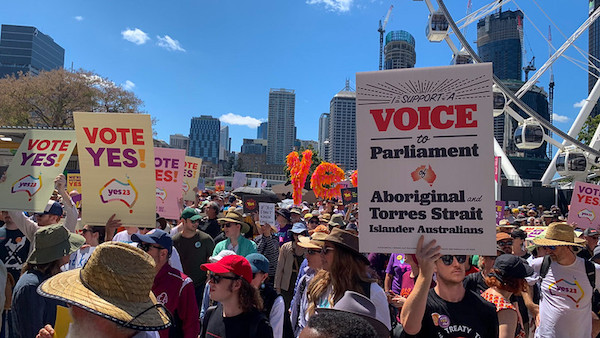Church leaders in Australia have called for a commitment to reconciliation and national unity after voters overwhelmingly rejected a plan to give greater political rights to indigenous people.
A majority of voters in all six states voted “No” in a referendum on a proposal to recognise First Nations people in the constitution and create a body dubbed “The Voice” to advise the national parliament on their behalf.
The Archbishop of Brisbane Mark Coleridge, who earlier this year spoke out in favour of “The Voice” and has backed similar initiatives in the past, said the referendum result had left the nation “more divided than ever and in many ways”.
“It’s ironic that a process supposed to unite the nation has done just the opposite,” Archbishop Coleridge said, after weeks of tense and bitter campaigning.
Supporters of the “Yes” campaign said that amending the constitution to recognise Indigenous peoples into the constitution would unite Australia.
However, opponents said that the idea was divisive, would create special “classes” of citizens with some “more equal than others”, and that the new advisory body would slow government decision-making.
“There’s an urgent need now to create a new kind of national unity, and that can’t be left to the politicians, because there’s more to this than politics,” Archbishop Coleridge said.
“A second thing is still clearer and more urgent: the search for reconciliation based on truth and justice must continue, even if the referendum process and result have made that more difficult.”
Most Catholic agencies, religious congregations and voluntary organisations publicly backed “The Voice”.
The Australian Catholic Bishops’ Conference had called for “a new engagement” with Aboriginal and Torres Strait Islander peoples in their annual Social Justice Statement, but did not back one side during the referendum campaign.
Australians must “avoid the temptations of both triumphalism and defeatism” said Archbishop Anthony Fisher of Sydney following the result. He called on the nation “to come together in genuine charity and recommit ourselves to closing the gap of disadvantage that Indigenous Australians face.”
He hoped that “the defeat of this particular proposal is not understood as a rejection of the ongoing process of reconciliation with Aboriginal and Torres Strait Islander people”.
The Bishop of Darwin Charles Gauci, whose diocese covers the entire Northern Territory in which almost a third of the population is indigenous, said the referendum debate had highlighted “that more had to be done to address the injustice experienced by so many First Nations people”.
“I meet people from all walks of life who recognise that Aboriginal and Torres Strait Islander peoples – the traditional custodians of our lands and waters for tens of thousands of years – struggle with poor outcomes in health, education, employment and a range of other areas,” Bishop Gauci said.
“Australians know those poor outcomes are not good enough.”
He continued: “While our Church’s history is not without blemish, the Church has been a driver of positive change. We have done that through education, through health and aged care, in social welfare and in the life of our parishes – where First Nations Catholics are growing in number.
“Our challenge is to do more.”
The prime minister Anthony Albanese said the referendum defeat was hard: “When you aim high, sometimes you fall short. We understand and respect that we have.”



 Loading ...
Loading ...